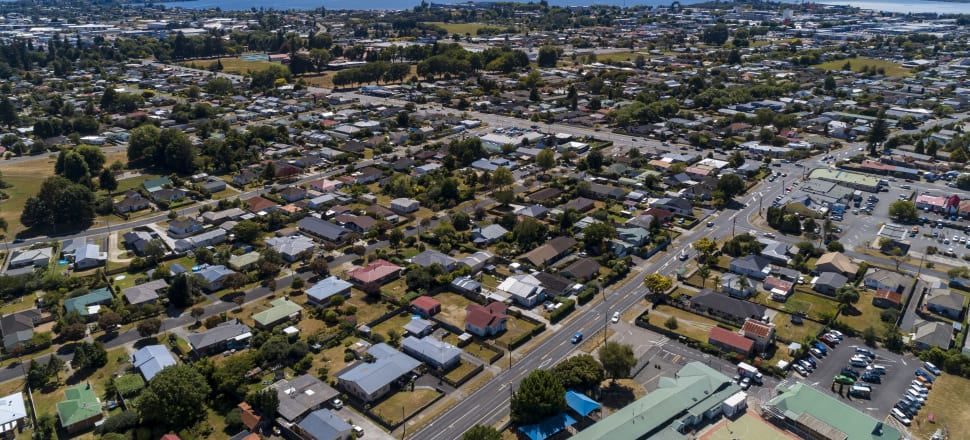
Officials forgot to collect information to measure the success of a local trial: 'If residents felt like their town was being used for an experiment, they were right,' says MP. 'The Government wasn't even learning from its experiment on their town,' says MP
Efforts to judge the success of an emergency housing pilot scheme in Rotorua have been stymied by officials failing to collect data or create measures for assessment, according to a new government report.
The news comes as ministers face pressure to deal with an overwhelmed and increasingly expensive system, with more than $1 billion spent on emergency housing grants since 2017 and a state house waiting list of roughly 27,000 people.
In mid-2021, the Government started to trial a new model for emergency housing, contracting motels for exclusive use and providing wraparound social services as well as 24-hour security.
The pilot is taking place in Rotorua, where some residents have complained about an influx of emergency housing tenants and associated vandalism and violence.
In a recent Cabinet committee paper, Finance Minister Grant Robertson – who is leading the Government’s work on the implementation unit – said he and Housing Minister Megan Woods had asked the unit to identify lessons learned from the pilot.
However, the unit said it couldn’t draw conclusions about the pilot’s initial impact on the emergency housing situation in Rotorua, “as the collection of appropriate data was not prioritised at the outset of the pilot”.
“At the time the report was done the outcomes were not able to be defined or measured. Work has been undertaken by agencies to resolve this.”
In its report to Robertson, the implementation unit said a failure to collect appropriate data had “hindered the corroboration of the positive points made by many participants in the review”.
“While intended results were identified at a high level, establishment of measures that would provide an understanding of the agreed outcomes across the pilot were not.”
'Time delays and litigating of roles'
There was no data or evidence available to back up anecdotal comments from interviewees who said there had been a notable reduction in antisocial behaviour around the motels.
Work was underway to fix the situation in Rotorua, but prioritising data collection and establishing how success would be evaluated would be “critical” for future models, officials concluded.
Among other concerns raised in the report were the cost of the pilot’s design and delivery phases, which were “resource intensive and would stretch the capability and capacity of agencies if replicated as a national model”.
“A more targeted approach is warranted where the promising aspects of the Rotorua pilot approach can be applied.”
A lack of clarity over the roles of the government agencies involved had also been a problem: while the emergency task force developed a model for Rotorua in March 2021, it took another three months for the social development and housing ministries to finalise which of them would handle the contracts for the motels, security and social services.
“Members of the taskforce report frustration at the lack of clarity, time delays and litigating of roles, legislative and policy settings between the two agencies,” the unit’s report said.
“If residents felt like their town was being used for an experiment, they were right, but it adds insult to injury that the Government wasn't even learning from its experiment on their town.” – Brooke van Velden, ACT Party MP
National housing spokesman Chris Bishop said the issues were “emblematic of this government’s approach to social policy – no real targets, no ways of measuring success and poor collection of data”.
The current emergency housing model was “shambolic and unsustainable” and needed to change, Bishop said.
“It was always designed as a short-term, temporary measure to tide people over until they could get into social housing. Now it’s become a sprawling, labyrinthine multimillion-dollar exercise which is making motels rich and trapping people in misery.”
ACT housing spokeswoman Brooke van Velden said Rotorua has been badly hit by “misbehaviour” in emergency housing.
While it was important to have innovation in social services, the Government had failed to ensure it could take advantage of the pilot, van Velden said.
“If residents felt like their town was being used for an experiment, they were right, but it adds insult to injury that the Government wasn't even learning from its experiment on their town.”
Housing Minister Megan Woods told Newsroom the Government had prioritised the swift set-up of the housing hub as the pilot was “all about implementing short-term solutions, to help build long term self-sufficiency, in response to an immediate need”.
While ministries had collected data on the number of clients who moved into contracted emergency housing then onto long-term accommodation, Woods said it took time to understand the community’s needs and what specific data was most useful.
“Taking this time to understand the community has enabled a new strengthened assessment and placement process, and most importantly provide better support for whānau, while continuing our hard work to deliver more permanent housing.”
Work on a wider review of the emergency housing system was ongoing and would be informed by the findings from the Rotorua evaluation, which Cabinet was likely to consider in October, Woods said.
.jpg?w=600)






